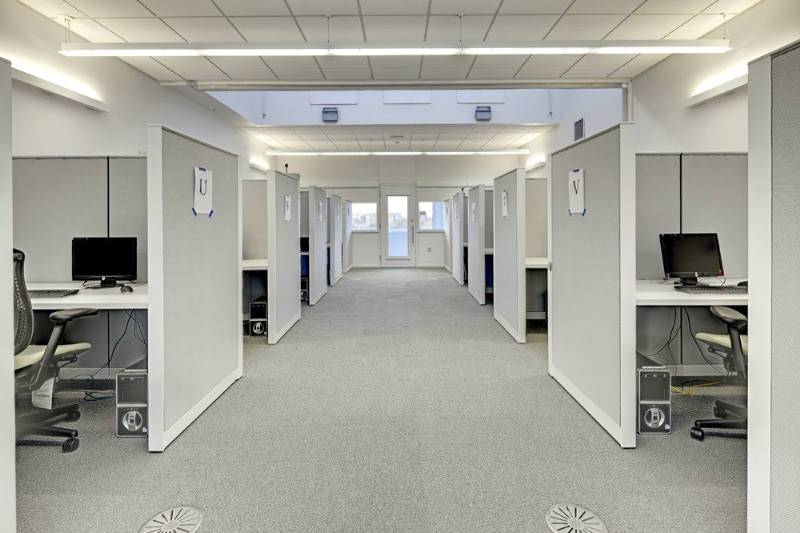17 June 2019
|
| Air pollution can impact health in a big way. And it’s not a problem reserved for the outdoors — the air indoors can be just as polluted. With people spending around 90% of their time indoors, and spending so much time at work, employers have a duty to keep the air their employees are breathing day in and day out clean and pure. Doing so will help reduce the risk of many health problems. Air to water heat pump supplier Daikin investigates… |
Be aware of Sick Building Syndrome
This is also known as Toxic House Syndrome. The NHS outlines some possible causes for the symptoms of this condition. Dust, smoke, bad ventilation, and inadequately maintained air conditioning units are all cited as potentially contributing towards the problem.
According to the World Health Organisation, the risks associated to poor indoor air quality are:
Addressing the causes
What are the main causes of poor air quality? An article by the British Lung Foundation noted that ventilation, temperature, damp, cooking, smoking, pets, cleaning products, and pollution from outside all build up within our buildings. It’s worth opening the windows of your offices for at least a little time every day, especially when you’re cooking. Check your workplace for damp too — this can cause myriad health problems, so you’ll want to treat it as soon as possible if found.
Take a look at your cleaning service too. Indeed, spray-bottle cleaners can cause the chemical cleaning product to partly disperse into the air. It’s better to opt for liquid cleaners that you can pour as much as you need. Consider other sprays too and only use them in well-ventilated areas.
Purifying the air
There are steps that can help maintain the air quality of your offices. A natural way to clean up the air is to scatter a few plants around the place. NASA has even conducted a study of the best air-purifying plants out there; try some aloe vera in the reception area, or a spider plant in the board room!
An air purification system can also be a wise choice. These powerful systems actively filter the air you breathe, capturing any harmful particles or pollutants and keeping the air as fresh as possible. Air purifiers can help lower allergy and asthma symptoms, as well as reduce the number of bacteria in the air you breathe. They’re also a great way to neutralise odours without resorting to harmful air fresheners.
As its second nature, considering the air we breathe is often overlooked. But it’s not something you can avoid. Take a look around your indoor spaces and ask yourself — what exactly am I breathing in every day?
This is also known as Toxic House Syndrome. The NHS outlines some possible causes for the symptoms of this condition. Dust, smoke, bad ventilation, and inadequately maintained air conditioning units are all cited as potentially contributing towards the problem.
According to the World Health Organisation, the risks associated to poor indoor air quality are:
- Stroke
- Chronic obstructive pulmonary disease
- Lung cancer
- Pneumonia
- Ischaemic heart disease
Addressing the causes
What are the main causes of poor air quality? An article by the British Lung Foundation noted that ventilation, temperature, damp, cooking, smoking, pets, cleaning products, and pollution from outside all build up within our buildings. It’s worth opening the windows of your offices for at least a little time every day, especially when you’re cooking. Check your workplace for damp too — this can cause myriad health problems, so you’ll want to treat it as soon as possible if found.
Take a look at your cleaning service too. Indeed, spray-bottle cleaners can cause the chemical cleaning product to partly disperse into the air. It’s better to opt for liquid cleaners that you can pour as much as you need. Consider other sprays too and only use them in well-ventilated areas.
Purifying the air
There are steps that can help maintain the air quality of your offices. A natural way to clean up the air is to scatter a few plants around the place. NASA has even conducted a study of the best air-purifying plants out there; try some aloe vera in the reception area, or a spider plant in the board room!
An air purification system can also be a wise choice. These powerful systems actively filter the air you breathe, capturing any harmful particles or pollutants and keeping the air as fresh as possible. Air purifiers can help lower allergy and asthma symptoms, as well as reduce the number of bacteria in the air you breathe. They’re also a great way to neutralise odours without resorting to harmful air fresheners.
As its second nature, considering the air we breathe is often overlooked. But it’s not something you can avoid. Take a look around your indoor spaces and ask yourself — what exactly am I breathing in every day?
Content continues after advertisements








